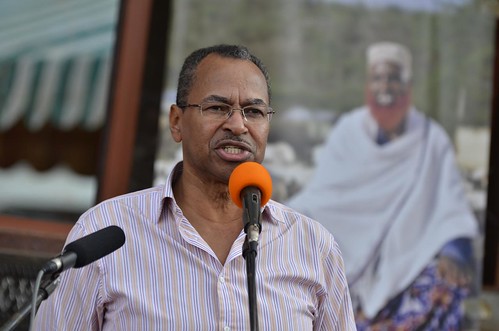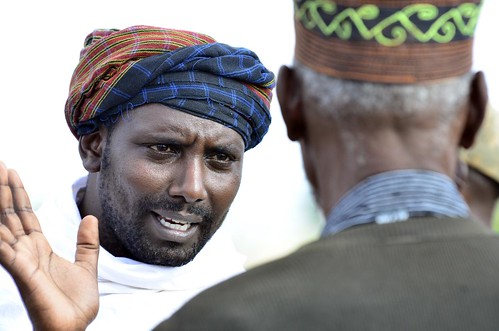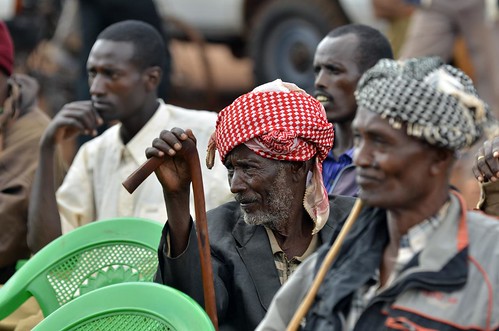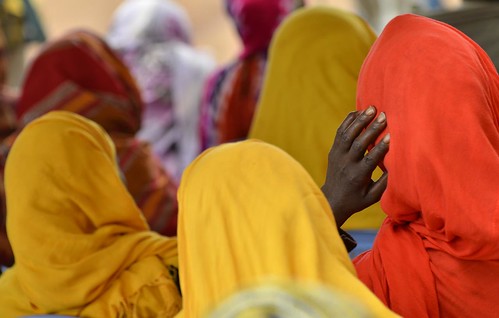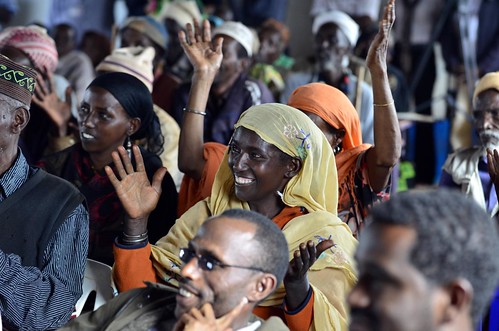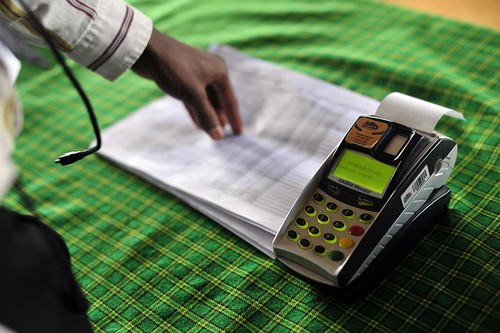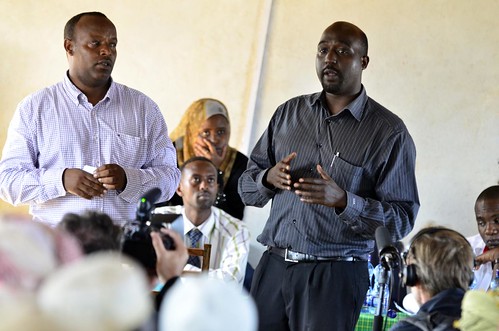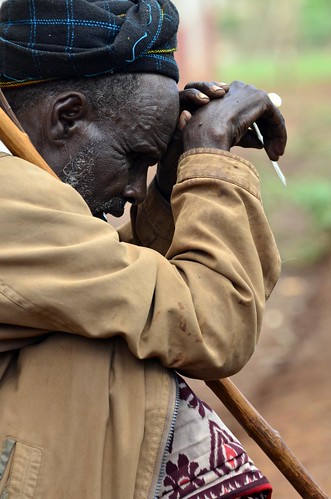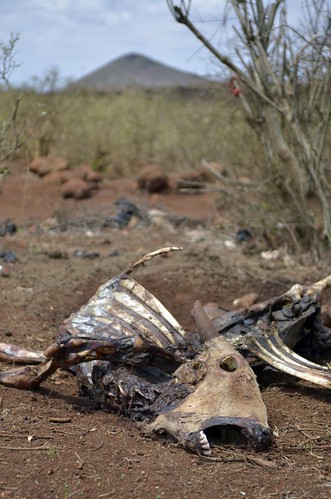ILRI director general Jimmy Smith speaks to residents of Marsabit, in northern Kenya, where a livestock insurance scheme has made its first payouts to small livestock keepers following a prolonged drought in the Horn of Africa (photo credit: Neil Palmer/CIAT).
Jimmy Smith, director general of the International Livestock Research Institute, made the following remarks on the occasion of the first payouts of index-based livestock insurance policies ever made to livestock herders in Africa in a region that has been afflicted by the drought that has reduced herds in the drylands of the Horn by a third.
Inhabitants of Marsabit town, in northern Kenya, attend a special event marking the first payouts of a livestock insurance scheme to small-scale livestock keepers following a prolonged drought in the Horn of Africa (photo credit: Neil Palmer/CIAT).
‘Today ILRI’s Index-Based Livestock Insurance (IBLI) project provides 650 livestock herders in Kenya’s remote Marsabit District with the very first payments of index-based livestock insurance claims ever made on this continent.
‘That makes this an important as well as historic moment.
Members of the Marsabit community listen to speakers at the launch of the first payouts of livestock insurance in Africa (photo credit: Neil Palmer/CIAT).
‘The success of any insurance scheme depends on its clients being confident that payments will be made if and when an insured event occurs. I hear that many have been reluctant to purchase the livestock insurance policies being offered to Marsabit’s livestock keepers in August and September of this year [2011] because the herders first wanted to be assured that this insurance product works and—in this time of great drought and livestock losses here and elsewhere in the Horn of Africa—if it will payout. Now that the appropriate payments are being made and in a timely manner, we hope we have earned the trust of people here, trust that will generate more widespread awareness and interest in this livestock insurance product.
Women of the Marsabit community listen to speakers at the launch of the first payouts of livestock insurance in Africa (photo credit: Neil Palmer/CIAT).
‘We are celebrating today not only the first payouts but also that the livestock index that predicts mortality in this region seems to be working well; several of our on-the-ground partners in Marsabit are in agreement with the figures. Our relatively inexpensive way of estimating livestock deaths in a time of drought and forage loss appears to be reliable and could now open the door to making livestock insurance widely available in Marsabit and similar areas in Kenya’s northern drylands, which are home to many of its pastoral peoples.
At a village meeting in Dirib Gombo, farmers who took out livestock insurance hear they are to receive their first payout after a prolonged drought in the region (photo credit: Neil Palmer/CIAT).
‘For all its initial success, this insurance project remains a work in progress. We’re aware of the challenges of raising awareness of the program in the more distant areas of Marsabit and making sales across the entire district. And even as we trust that those who purchased this livestock insurance will receive their payments in the shortest time possible, we recognize that many clients will have to be paid manually, a process that involves costly driving to areas as far as Loiyangalani and Illeret, where some pastoralists also bought contracts. That said, over the last three insurance sales periods since January 2010, Equity Bank’s Point of Sale systems and UAP’s telephone scanners have made the process more efficient. Over the next several seasons, on-going efforts will continue to improve the technology platforms delivering IBLI services, making them increasingly more cost-effective and accessible.
At a village meeting in Dirib Gombo, officials prepare to make the first insurance payouts after a prolonged drought in the region (photo credit: Neil Palmer/CIAT).
‘The most important sign of success is the response of the client. So even as payments are being made, we at ILRI want to know what impact the payments are having and how valuable the insurance product is. You will see the ILRI team in this area conducting research to understand how IBLI is benefiting the community and those households that bought livestock insurance. We worked with members of the community to design and develop this product, and we are keen to receive your suggestions about ways to improve it.
At a village meeting in Dirib Gombo, farmers who took out livestock insurance receive their first payout after a prolonged drought in the region (photo credit: Neil Palmer/CIAT).
‘‘A project such as this is necessarily a product of collaboration. ILRI and our commercial partners Equity Bank and UAP Insurance—those who actually market and sell the product—are quite visible, but there are several others that must be recognized. Cornell University and the Index Insurance Innovation Initiative (I4) based out of the University of California at Davis have been instrumental in the development of the IBLI product and supporting the research agenda behind it. Closer to the ground, members of the Marsabit District Steering Group have offered invaluable support and advice to the project team, as has Food for the Hungry International. The project has also received tremendous support from the Ministry of the Development of Northern Kenya and the Ministry of Livestock and the Provincial Administration, from the District Commissioner to chiefs and counsellors across Marsabit. Finally there are the hundreds of young men and women across all divisions of Marsabit who have worked tirelessly conducting surveys and product education and extension.
Leader of the Index-Based Livestock Insurance Project, ILRI’s Andrew Mude (right), answers a questions from the Marsabit community (photo credit: Neil Palmer/CIAT).
‘We’re now working to see if IBLI can be sustained by commercial partners such as Equity Bank, UAP and others that may be interested. Currently, however, the research, design and implementation of the IBLI project has been funded by numerous donors who believe in its potential. For this we must thank the European Union, the Global Index Insurance Facility, the Microinsurance Facility, the World Bank and the United States Agency for International Development. The British Government, through UKAID, has been one of the largest supporters of the project and, together with the European Union, will be funding the second phase of scaling up.’
A farmer awaits a livestock insurance payout following a village meeting in Dirib Gombo, near the northern Kenyan town of Marsabit; some farmers in the village took out livestock insurance, and this year are receiving the first payouts after a prolonged drought in the region (photo credit: Neil Palmer/CIAT).
One of the many head of cattle that perished for lack of fodder in the drought that dried up the rangelands of Kenya’s Marsabit District this year (photo credit: Neil Palmer/CIAT).
Read a related story on this ILRI News Blog: Herders in drought-stricken northern Kenya get first livestock insurance payments
Editor’s note, 26 Oct 2011: The original title of this blog post, ‘Livestock director and partners launch first-ever livestock insurance payments in Africa,’ was changed to ‘Livestock director and partners launch first-ever index-based livestock insurance payments in Africa;’ other forms of livestock insurance (not index-based) have been available in other parts of Africa. Two similar statements in the body of the blog were similarly corrected.

